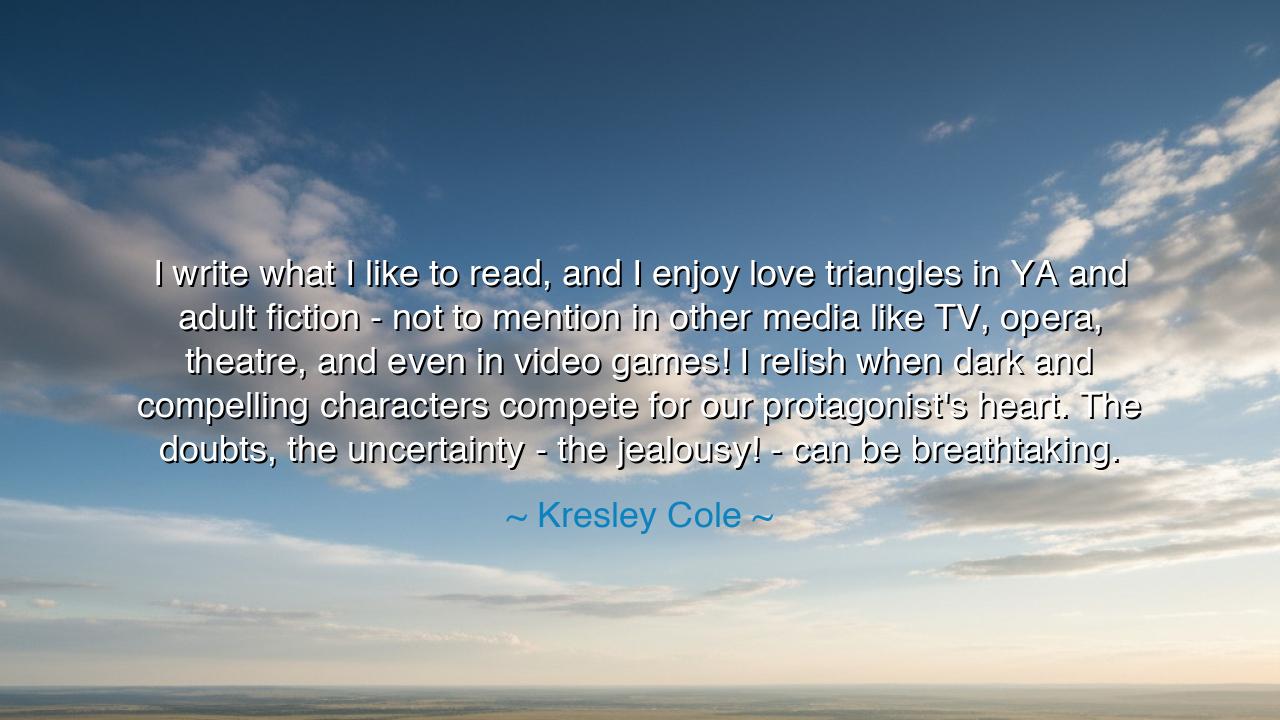
I write what I like to read, and I enjoy love triangles in YA and
I write what I like to read, and I enjoy love triangles in YA and adult fiction - not to mention in other media like TV, opera, theatre, and even in video games! I relish when dark and compelling characters compete for our protagonist's heart. The doubts, the uncertainty - the jealousy! - can be breathtaking.






Kresley Cole, mistress of the written word and weaver of passion-filled tales, once declared: “I write what I like to read, and I enjoy love triangles in YA and adult fiction—not to mention in other media like TV, opera, theatre, and even in video games! I relish when dark and compelling characters compete for our protagonist's heart. The doubts, the uncertainty—the jealousy!—can be breathtaking.” In this confession, she reveals not merely her taste as a writer, but a profound truth about human longing: that we are drawn to stories of conflict in love because they echo the struggles of our own hearts. Jealousy, though feared in life, becomes a fire in art—dangerous, illuminating, and unforgettable.
The essence of her words is that art imitates the passions of humanity, and among these passions, few burn more brightly than the triangle of love and rivalry. In such tales, the heart of the protagonist is not merely an object of affection, but a battlefield. On this battlefield, desire clashes with doubt, loyalty with temptation, and certainty with mystery. The tension, the waiting, the sharp sting of jealousy—all these grip the reader’s soul, because they mirror the storms that sweep across the human spirit in life itself.
The ancients understood this well. From the tragedies of Euripides to the operas of Verdi, the triangle of love has appeared again and again. Helen of Troy, the face that launched a thousand ships, stood between Paris and Menelaus, and their rivalry brought ruin to nations. In the court of King Arthur, Guinevere’s love divided her between Arthur and Lancelot, and their entanglement destroyed a kingdom. These tales endure not because they are rare, but because they reveal how love, jealousy, and uncertainty hold the power to shape not only hearts but histories.
What Cole describes with delight—the breathtaking nature of jealousy—is the paradox of human nature. We fear jealousy in our lives, yet we are captivated by it in stories. This is because art allows us to enter the danger without being consumed. We can watch the storm, feel its winds, taste its lightning, and yet walk away unscathed. The tension excites, the rivalry enthralls, and the uncertainty keeps us bound to the tale, eager to see whose love will triumph, and at what cost.
Yet the meaning of her words extends beyond entertainment. They remind us that conflict, even painful conflict, can hold beauty and truth. To see characters torn between choices reflects our own struggles in life—not only in romance, but in loyalty, in ambition, in morality itself. The love triangle is but a symbol of the greater human dilemma: that we are pulled in many directions, that we often desire conflicting things, and that doubt itself is part of what makes us alive.
History offers us a living example in the life of Cleopatra. Her love for Julius Caesar, followed by her entanglement with Mark Antony, was more than a private passion—it was a drama of nations. Rome itself trembled under the weight of her choices, and her story has been told again and again for centuries. The jealousy, the rivalry, the uncertainty of her affections shaped the fate of empires. What Cole relishes in fiction, history itself has repeated with devastating beauty.
The lesson, then, is not merely that jealousy and conflict entertain us, but that they teach us. They remind us of the power of emotion to guide our actions, for better or worse. In our own lives, we must recognize the allure of jealousy while guarding ourselves against its ruin. We may appreciate its drama in art, but in life we must seek trust, patience, and clarity. To admire the storm from afar is wisdom; to live in it without caution is folly.
So let this teaching endure: embrace the stories that stir your spirit, for they reveal truths of the heart. Relish the tales of love and rivalry, but remember that their purpose is to awaken understanding, not to enslave your life. Let jealousy in art remind you of passion’s fire, but let wisdom in life teach you to master it. For in this balance—between the drama we enjoy and the peace we seek—we find both the beauty of stories and the strength of the soul.






AAdministratorAdministrator
Welcome, honored guests. Please leave a comment, we will respond soon